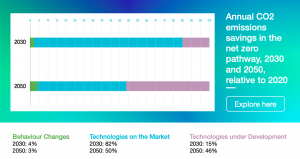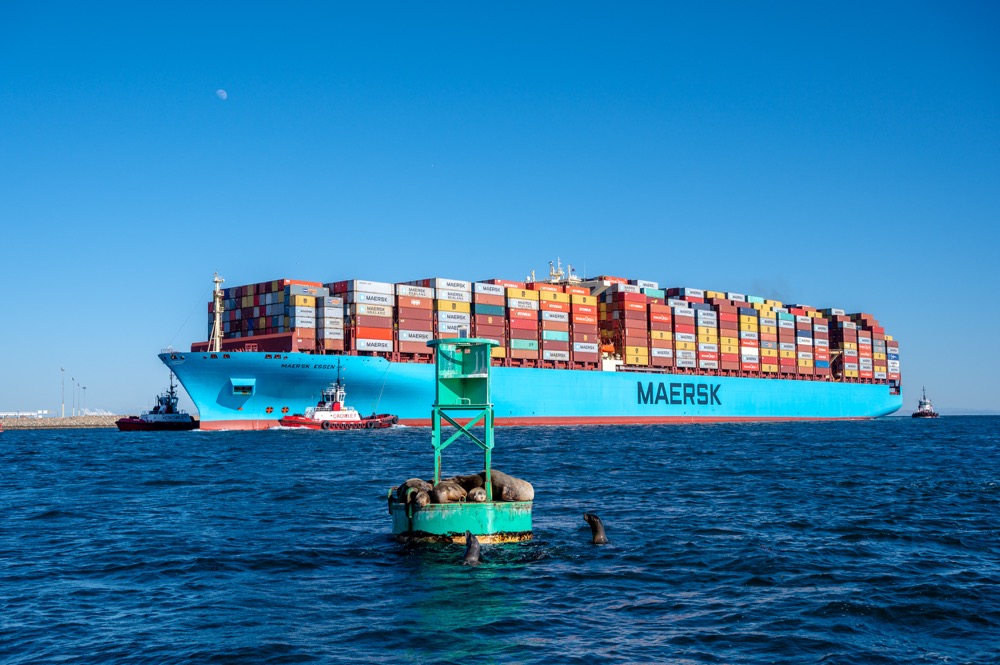Glasgow, Scotland — The World Economic Forum, in partnership with US Special Presidential Envoy for Climate John Kerry, today announced the First Movers Coalition, a new platform for companies to make purchasing commitments that create new market demand for low and zero carbon fuels and technologies. Among the eight “harder-to-abate” sectors addressed by the First Movers Coalition, an ambitious commitment was established for use of scalable zero-emission fuels in maritime shipping.
Specifically, for maritime carriers, at least 5% of deep-sea shipping will be powered by zero-emission fuels by 2030. The importance of a 2030 “breakthrough” target has been established: an S-curve based analysis suggests that zero emission fuels need to make up 5% of the international shipping fuel mix by 2030 to enable Paris-aligned decarbonization of shipping by 2050, as highlighted in a recent insight brief from the Global Maritime Forum, University College London, and UNFCCC High Level Climate Champions.
For cargo owners, at least 10% of the volume of goods shipped internationally will be on ships using zero-emission fuels by 2030; on the way to 100% by 2040, a target that is in line with the recently announced Cargo Owners for Zero Emission Vessels initiative.
Significantly, to qualify under First Movers Coalition commitments as being zero emission, fuels must meet the following criteria: have zero greenhouse gas emissions on a lifecycle basis; be sufficiently scalable to decarbonize the entire shipping industry when blended or used as standalones; address land use and other sustainability concerns; and demonstrate they can be used safely through appropriate training and standards.
The aim is to catalyze adoption of new zero-emission fuels and technologies deemed necessary for full sector decarbonization by 2050. Leading analysis identifies that this goal is most likely to be accomplished with hydrogen-based fuels.
“The First Movers Coalition shipping commitments are consistent with the ambition of the Paris Agreement and fully aligned with the 2040 target and zero-carbon fuel criteria set recently by Cargo Owners for Zero Emission Vessels,” said Ingrid Irigoyen, Director of the Aspen Institute Shipping Decarbonization Initiative. “We must remember that these new fuels are not yet in commercial use for deep sea shipping, and entire new supply chains need to be built, making these forward-looking commitments truly commendable. We congratulate these corporate climate leaders for demonstrating the power of collective private sector action to decarbonize shipping here at COP26.”
“By aggregating demand, the First Movers Coalition will drive the uptake of new zero emission technologies and fuels in shipping,” said Johannah Christensen, Chief Executive Officer of the Global Maritime Forum. “A first step is implementation of industrial scale demonstration projects and green corridors to ensure safety, reliability, and sustainability of new technologies across the full value chain. Only with such collaborative efforts can we make zero emission shipping the default choice by 2030.”
These new shipping commitments are aligned with and developed in collaboration with the Getting to Zero Coalition—a partnership between the Global Maritime Forum, the World Economic Forum and the Friends of Ocean Action. University College London Energy Institute, including through UMAS, provided technical analysis in support of these existing efforts, as well as the new First Movers Coalition.
The First Movers Coalition will work across eight key sectors. Seven of these sectors – steel, cement, aluminum, chemicals, shipping, aviation, and trucking – account for more than a third of global carbon emissions, but do not have cost-competitive energy alternatives to fossil fuels. Founding member companies of the new coalition make a purchasing commitment in at least one of the sectors. The founding member companies include: A.P. Moller-Maersk, Agility, Airbus, Bank of America, Mahindra Group, Nokia, Scania, Amazon, Trafigura Group, Deutsche Post, Boeing, Volvo Group and Western Digital. (Photo Maersk)






